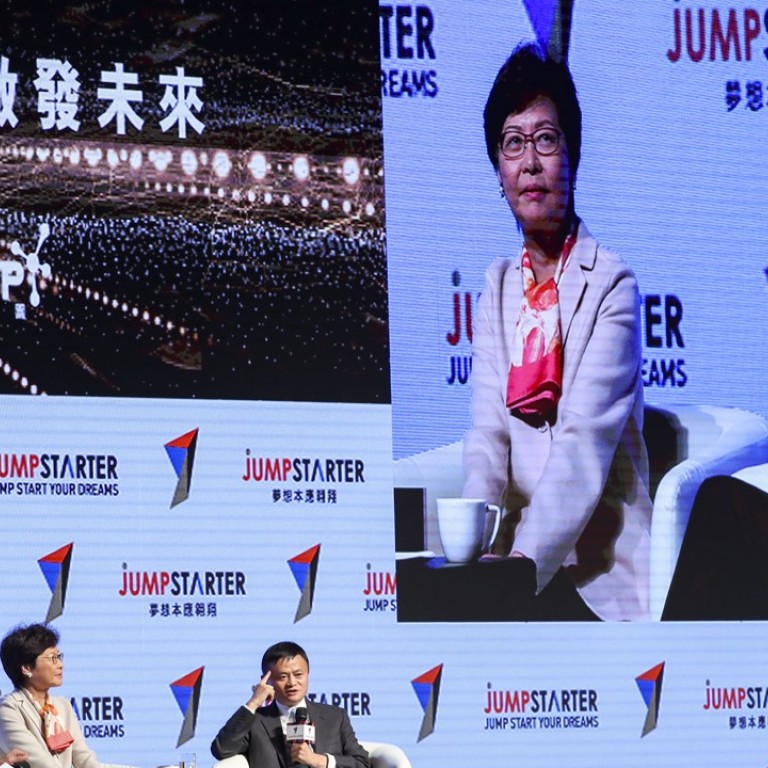
Hong Kong chief executive calls for measures to attract best talent
‘We need to do more in terms of immigration policies’ to boost innovation and technology, says Carrie Lam at the Jumpstarter 2017 finals
As the Hong Kong government looks to boost innovation and technology in the city, immigration policies need to be improved to bring in external talent, according to the city’s chief executive.
“We need more time to nurture local talent and [in the meantime] we need to bring in outside talent. Hong Kong remains very attractive to a lot of expatriates and people from the mainland … we need to do more in terms of immigration policies,” said Carrie Lam Yuet-ngor at the grand final of Alibaba’s start-up competition, Jumpstarter 2017, on Tuesday.
Since Lam became chief executive in July, she has identified innovation and technology as a main area of focus, proposing a slew of initiatives including generous tax deductions for companies that invest in research and development.
Lam added that the government also needs to look within itself to remove any obstacles that may “impede the development of innovation and technology”, such as removing “obsolete legislation” and opening up government data for companies to build upon.
In her first policy address last month, Lam said that she will lead a new high-level interdepartmental steering committee on innovation and technology, and has emphasised the importance of Hong Kong becoming a “smart city” to maintain its global competitiveness.
For artificial intelligence and start-ups, talent is the most important thing
Professor Tang Xiaoou, founder of Hong Kong and Beijing-based artificial intelligence start-up SenseTime, also urged the Hong Kong government to “open up the borders for talent” in order to propel the city to greater heights of innovation.
“For artificial intelligence and start-ups, talent is the most important thing, we need critical mass to continue. If you only rely on people from one city with six to seven million people, you can never do it,” Tang said at the same event.
“[Hong Kong] has to open up, let people come in. Once [that happens] all the other advantages will play in your favour and Hong Kong will really take off, young people will have a great chance to succeed in start-ups.”
SenseTime, which makes artificial intelligence software that can identify objects and faces, is one of Hong Kong’s few unicorns – a term given to start-ups valued at US$1 billion and above.
Jack Ma, founder and executive chairman of Alibaba, said on Tuesday that he was “very optimistic” about Hong Kong’s future and added that although the city is not a large market, Alibaba is interested in the talent that the city offers.
The reason Hong Kong has been so successful in the past 50 years is because it is open-minded and accommodates all kinds of cultures
“The reason why Hong Kong has been so successful in the past 50 years is because Hong Kong is very open-minded, and accommodates all kinds of cultures. [Hong Kong] should also welcome people from all over the world,” Ma said.
“Young people in Hong Kong, don’t focus your eyes only on Hong Kong. Anywhere there is opportunity, go there and build [something], and bring ideas back.”
Alibaba has been making a push to support entrepreneurship in the city by starting the Alibaba Hong Kong Entrepreneurs Fund, a not-for-profit initiative that has invested in local start-ups such as fashion company Grana, genetics testing firm Prenetics and logistics start-up GoGoVan.
The company this year also partnered with Cyberport and the Hong Kong Science and Technology Parks to launch Jumpstarter 2017, a US$3 million start-up competition in the city to identify and nurture companies that show potential.
The grand final on Tuesday saw 24 start-ups across eight categories pitch to judges, with the three winners – local indoor agriculture farm Farm66, energy management start-up En-trak and surgical robotics firm CuttingEdge MedTech – winning up to US$1 million in investment commitment each from the Alibaba Hong Kong Entrepreneurs Fund. Almost 600 start-ups applied to take part in Jumpstarter 2017, according to Alibaba, which owns the South China Morning Post.

